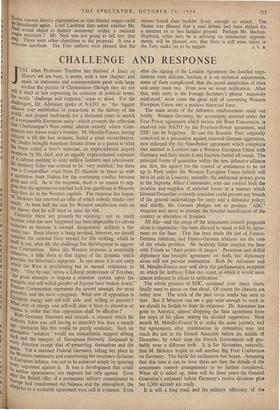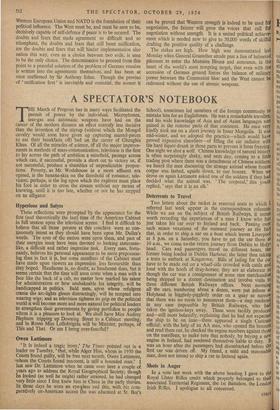CHALLENGE AND RESPONSE
IUST when Professor Toynbee has finished A Study of History- we are busy, it seems, with a new chapter; and again, as statesmen and correspondents paint with large strokes the picture of Christendom (though they do not call it that) at last expressing its cohesion in political terms, the words ' challenge and response' come to mind. For the challengers, Dr. Adenauer spoke of NATO as ' the biggest alliance ever established in peace-time in the history of the World,' and groped backwards for a thousand years in search of a comparable European unity—which prompts the reflection that Charlemagne's West ended almost exactly where Com- munism has drawn today's frontier. M. Mendes-France, having , _delayed it till the last moment, hailed a great reconciliation. Mr. Dulles brought AmeriCan dreams home in a parcel to what the Press called a hero's welcome, an unprecedented airport reception by his chief, and an equally unprecedented exposure °(,f a cabinet meeting to sixty million listeners and televiewers. Su Anthony Eden was content to be ' very satisfied,' but there Was a Cromwellian voice from El Alamein to brace us with a quotation from Joshua for the continuing conflict between good and evil. As to the response, there is no reason to sup- Pose that the agreements reached look less significant in Moscow than they do in the Western capitals. The response has begun. M. Molotov has renewed an offer of which nobody thinks very much. At least half the case for Western satisfaction rests on we theory that he will have to raise his bid. . Certainly there are grounds for rejoicing : not so much because what has now happened has been impossible for eleven centuries as because it seemed dangerously unlikely a few Weeks ago. Since history is being invoked, however, we should consider the external force needed for this welding, which in itself is not, after all. the challenge but the response to aggres- sive Communism. Since this Western response is essentially defensive. it falls short in that degree of the dynamic which provides the historian's signposts. In one sense it is not unity "eh the West is proclaiming but its eternal resistance to ut,1tY. ' One by one,' wrote a Liberal predecessor of Toynbee, great attempts to impose a common system upon the energetic and self-willed peoples of Europe have broken down.' Russian Communism represents the newest attempt, the most powerful, and the most repugnant. What sort of opposition is European energy and self-will able and willing to present ? what -sort of energy and self-will does it have to abandon or repress in order that that opposition shall be effective 7 A_Wtth Germany disarmed and neutral—a chimera which Sir 74thony Eden was still having to demolish less than a month ",,P----questions like this would be purely academic. Such an Ziternative ' solution' would see transatlantic support ebbing back and the energies of Europeans furiously dissipated in ,s...vCry direction except that of preserving themselves and the 'Tee. Yet a rearmed Federal Germany, taking her place in u_e Western community and contributing her necessary divisions eLe European defence, was not to be achieved simply by ignoring isv_erY .argument against it. It was a development that could .. neither spontaneous nor imposed but only agreed. Even ;ter the British offer of a permanent military commitment in obstacles had transformed the balance and the atmosphere, the uostacles to a workable agreement were still in evidence. Even after the signing of the London Agreement the detailed nego- tiations were delicate, because it is on technical adjustments. some of them complicated, that the grand simplicities of trust and unity must rest. Even now we await ratification. After that, with unity in the Foreign Secretary's phrase ' massively reinforced,' must come the great task of converting Western European Union into a positive historical force.
The main struts of the defensive reinforcement stand out boldly. Western-Germany, her sovereignty restored under the Four-Power agreement which revises the Bonn Convention, is received into NATO by the Fourteen-Power agreement, and EDC can be forgotten. So can the Brussels Pact, originally conceived as a precaution against renewed German aggression. now enlarged (by the Nine-Power agreement which completes that reached in London) into a Western European Union with Germany and Italy inside it and hatchets buried all round. The principal forms of guarantee within the new defensive alliance are, first, the agency for the control of armaments to be set up in Paris under the Western European Union (which will have its seat in London); secondly, the additional powers given to the Supreme Allied Commander, who can control both the location and -supplies of national forces in a manner which General Gruenther evidently considers could prevent any breach of the general undertakings for unity and a defensive policy; and thirdly, the German pledges not to produce ' ABC' weapons and never to attempt the forceful reunification of the country or alteration of frontiers.
All this—and the range of the armaments control proposals alone is impressive—has been allowed to stand or fall by agree- ment on the Saar. That has been made the test of Franco- German relations. and Franco-German relations are the core of the whole problem. Sir Anthony Eden coupled the Saar with Trieste as flash-points of danger.' Persistent and skilful diplomacy has brought' agreement on both, but diplomacy alone will not prevent combustion. Both Dr. Adenauer and M. Mendes-France may well envy the parliamentary reception on which Sir Anthony Eden can count. in which it would seem almost indecent to allude to ratification.
The whole promise of EDC, sustained over many years, finally went to pieces on that shoal. Of course the chances are better now. The work of the past seven weeks has seen to that. But if Moscow can see a gap wide enough to work in we should be foolish to deny its existence. Dr. Adenauer has gone to America. almost dropping the Saar agreement from the 'steps of his plane among his divided supporters. Next month M. Mendes-France is to make the same journey, and the agreements, after examination in committee, may not reach the test in the French Assembly before the middle of December, by which time the French Government will pro- bably wear a • different look. It is for November, naturally, that M. Molotov hoped to call another Big Four Conference on Germany. The battle for ratification has begun. Assuming that this time it can,be won. there are then the details of the armaments control arrangements to be further considered. When all is tidied up, there will be three years (in General Gruenther's estimate) before Germany's twelve divisions plus her 1,300 aircraft are ready.
It is still a long road. and the military efficiency of the Western European Union and NATO is the foundation of their political influence. The West must be. and must be seen to be, decisively capable of self-defence if peace is to be secured. The doubts and fears that made agreement so difficult and so triumphant, the doubts and fears that still beset ratification, are the doubts and fears that will hinder implementation also unless this way, even as a choice between two evils, is seen to be the only choice. The determination to proceed from this point to a peaceful solution of the problem of German reunion is written into the agreements themselves, and has been at once reaffirmed by Sir Anthony Eden. Though the proviso of ratification first' is inevitable and essential, the sooner it can be proved that Western strength is indeed to be used fa negotiation, the fainter will grow the voices that call fof negotiation without strength. It is a united political achieve• ment which is needed now to give to 30,000 words of skilful drafting the positive quality of a challenge. The stakes are high. How high was demonstrated last Monday when General Gruenther strode past a line of helmeted pikemen to enter the Mansion House and announce, in the heart of the world's most tempting target, that even with the accession of German ground forces the balance of military power between the Communist bloc and the West cannot be redressed without the use of atomic weapons.



































 Previous page
Previous page